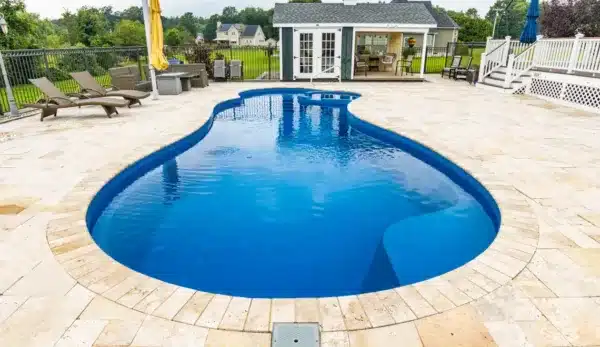In Florida’s hot and humid climate, maintainance of a fiberglass pool requires special attention to prevent damage. This will also extend its lifespan. Regular cleaning is essential to avoid algae growth. Furthermore warm temperatures can promote rapid development. Monitoring and balancing the pool’s water chemistry is also crucial. Particularly with pH levels, to prevent staining or discoloration on the smooth fiberglass surface. Additionally, periodic inspection of the pool’s filtration system ensures it operates efficiently. Given Florida’s frequent rains and storms, debris removal is often needed to prevent clogging and maintain the pool’s aesthetics and functionality.
Maintaining a fiberglass pool in Palm Beach, Florida, requires a specific approach due to the region’s tropical climate. Frequent rains, and intense sun exposure does not help as well. Fiberglass pools are known for their durability and low maintenance. However, they still need regular care to ensure longevity and to keep the pool in top condition.
1. Fiberglass pool maintenance : Water Chemistry Balance:
Proper water chemistry is essential for fiberglass pools, especially in Palm Beach, where high temperatures and humidity can cause imbalances more quickly. Pool owners should regularly check and balance pH levels, alkalinity, and calcium hardness. Keeping the pH level between 7.2 and 7.8 helps prevent damage to the pool’s surface and reduces the risk of staining. In Florida’s humid climate, you’ll also need to monitor chlorine levels closely to prevent algae growth, as warm water can encourage rapid algae development.
2. Cleaning and Debris Removal:
Palm Beach experiences frequent storms and heavy rains, which can lead to debris like leaves, branches, and dirt entering the pool. Regular skimming and vacuuming are essential to keep the pool clean and avoid clogging the filtration system. Fiberglass pools typically require less scrubbing than concrete pools because their smooth surface is less porous. It is important to notice that brushing the walls and floor periodically helps prevent algae buildup.
3. Filtration System Maintenance:
The pool’s filtration system plays a critical role in maintaining water clarity and cleanliness. Inspecting and cleaning the filters, pumps, and skimmers regularly ensures the system operates efficiently. After storms or heavy rain, it’s important to check for clogs or damage in the filtration system.
4. Gelcoat Inspection:
Fiberglass pools are coated with a protective gelcoat that gives the pool its smooth, glossy finish. Periodically inspecting the gelcoat for any signs of cracking, fading, or blistering,is necessary. Small cracks or discoloration can often be repaired, but early detection is key to avoiding bigger issues.
By staying proactive with these maintenance tasks, pool owners in Palm Beach can enjoy their fiberglass pools with minimal hassle while ensuring their investment lasts for years.

